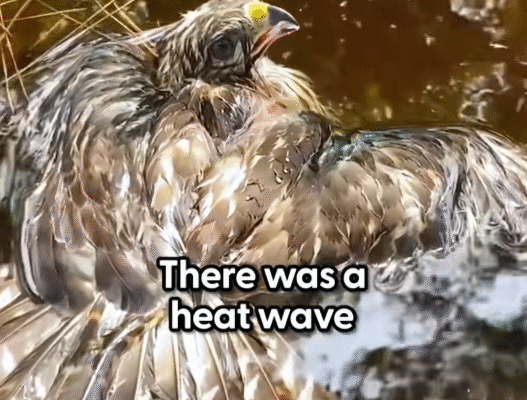It was a scorching afternoon in late summer, the kind of day when even the cicadas seemed too tired to sing. The sun had been unrelenting since morning, and the air shimmered with heat. I had just returned home from town, my clothes clinging to my skin and my throat parched. I walked toward the back of my property, where the old water tank stood—a large, metal container raised on concrete blocks that stored rainwater for our small vegetable garden.
As I reached the tank, I noticed something odd. The lid was slightly ajar, which was unusual. I always made sure it was tightly closed to prevent insects or leaves from falling in. Curious and a bit concerned about contamination, I climbed the small ladder on the side and peered inside.
My eyes widened in shock. There, struggling and flapping its wings in the water, was a large bird—soaked, exhausted, and clearly on the verge of drowning. It took me a moment to register what I was looking at. Then I saw the sharp beak, the piercing golden eyes, and the distinctive brown and white plumage.
It was a hawk.

Panic surged through me. How had it gotten in? Maybe it had been chasing prey and swooped too low, or maybe the heat made it think the water was a shallow pool. Whatever the reason, the poor bird was now fighting for its life.
Without hesitation, I grabbed a long-handled net we usually used to scoop leaves out of the tank. The hawk’s wings beat weakly against the surface as it tried to stay afloat. I lowered the net slowly, not wanting to scare it even more. The bird eyed me with a mix of fear and desperation, but it didn’t resist as I gently maneuvered it into the net.
It was heavier than I expected, and water splashed everywhere as I hoisted it out. The hawk’s talons clung weakly to the net’s edge, and I carefully laid it on the grass nearby. It looked absolutely miserable—wings splayed out, feathers soaked and matted, chest heaving with each breath.
I backed off to give it space. I’d never been this close to a hawk before. Its size, even in this weakened state, was intimidating. I could see every detail of its feathers, the sharp curve of its beak, and the wild, intelligent glint in its eyes.
At first, I wasn’t sure what to do next. Should I call animal control? A wildlife rescue center? I didn’t want to make things worse by handling it the wrong way. But I also didn’t want to leave it alone, vulnerable to predators or further injury.
I ran back to the house, grabbed a towel, a shallow tray of water, and my phone. I returned to find the hawk still lying there, shivering slightly. I placed the towel nearby and set the tray of water a short distance away. Then I sat down a few feet from the bird and called the local wildlife rescue line.
The volunteer on the phone was calm and informative. She asked about the hawk’s condition and told me that it might just need time to dry off and recover its strength. “Keep an eye on it from a distance,” she advised. “As long as there are no obvious injuries and it’s breathing steadily, it may fly off on its own once it regains energy.”
So I waited.
Minutes turned into an hour. The sun began to dip lower in the sky, casting long golden shadows across the field. Slowly, the hawk began to move. It tucked its wings closer to its body, adjusted its posture, and eventually stood upright—wobbly but alert.
It was a beautiful sight.
As it dried off, I noticed how regal it looked. Its feathers, now fluffing out a bit, caught the light in shades of bronze and rust. It looked around cautiously, occasionally fixing its gaze on me, but it no longer seemed terrified—just tired.
Then came the moment I’d been hoping for. The hawk stretched one wing, then the other. It hopped once, then twice. With a sudden, powerful beat of its wings, it rose clumsily into the air. My heart skipped a beat as it lifted off the ground, circled above me once, and then soared away into the sky.
I watched it disappear over the treetops, feeling a wave of emotion I didn’t expect—relief, awe, even a bit of pride.
I had saved a hawk.
Later that evening, as the sky turned purple and the first stars appeared, I went back to check the tank. I secured the lid tightly this time, placing a small weighted stone on top just to be sure. I didn’t want this to happen again—to any creature.
The experience stayed with me. In a world where we often feel powerless, helping that hawk reminded me that small actions can matter deeply. I thought about how easily I could have missed it—how just a few minutes more and it might have drowned. But fate had lined things up just right. And maybe, in some small way, the hawk understood that too.
The next morning, I walked to the field behind my house with a pair of binoculars. I didn’t really expect to see it again, but I scanned the sky anyway. And then, high above the trees, a lone hawk circled in slow, graceful loops.
I smiled.
Maybe it was the same bird, maybe not. But in that moment, I felt connected to something wild and wonderful. And I knew I would never forget the day I found a hawk in the water tank—and saved it.



